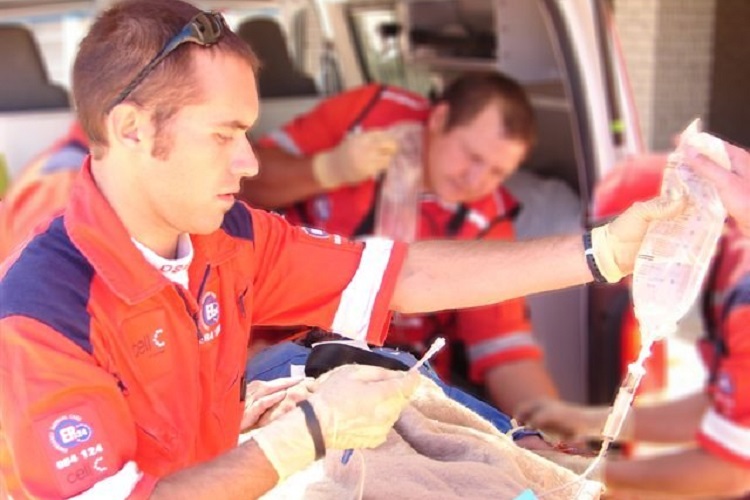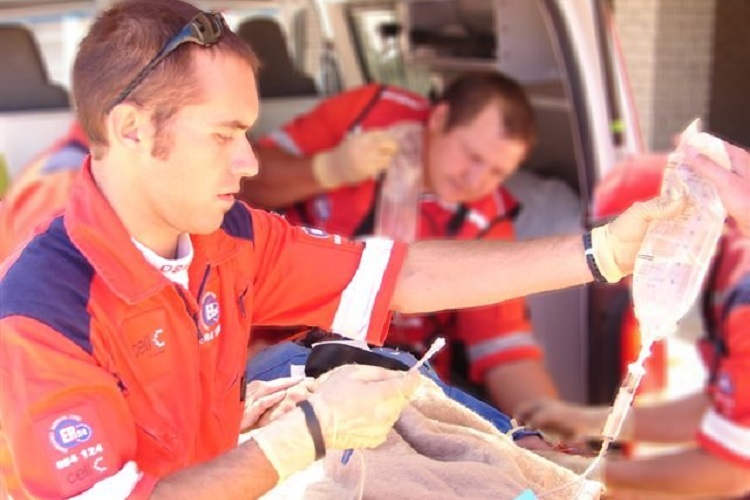

Photo courtesy of Werner Vermaak.
By Michael Morse
There is very little that will instill more fear into the heart of a first-due firefighter than a pediatric call. Even the most experienced responders are often uncomfortable with other people’s children. Childless firefighters are especially vulnerable to the jitters that a 20-pound patient brings. I did not have any babies in my life for the first few years of my firefighting career. I would literally panic at the thought of not just treating a sick kid, but even simply handling one.
Holding a newborn creates tension in a new parent; holding someone else’s sick infant is a downright intimidating experience. When that child is not breathing or is in severe distress, all of the firefighting experience in the world does little to mitigate the helplessness that can overcome a person not used to handling babies.
Let’s face it—treating kids is awful. Everything changes when the little buggers are put into our mix. We all know how our minds and bodies react when responding to an occupied house fire with reports of children trapped. Everything gains intensity as we produce obscene amounts of adrenaline. Our breathing increases, our heart rates soar, our heads empty of all useless chatter to dedicate our mind power to the job at hand. It’s that way on pediatric emergency medical services (EMS) calls as well, though probably not as dramatic.
Most 911 callers perceive their situation to be out of their control. Whatever is happening when the decision to call for help is made is usually quite horrific. Relinquishing control of a sick or injured child is an emotionally crippling experience for most parents. Doing so to firefighters who are competent, kind, and confident makes that experience bearable.
RELATED: Owens on Pediatric Seizures ‖ Mazurek on Pediatric Critical Care ‖ Vitiello on Child Abuse
There is no substitute for a living, crying, squirming, laughing, peeing, and completely unpredictable baby. The only way to become confident handling a baby is to handle a baby. For many firefighters, this is simply not an option. Everything concerning pediatric EMS responses is a mystery to even the most seasoned firefighters such as car seats, seizures, fevers, suppositories, and the million-and-one other things that are part of nurturing the most vulnerable among us.
Although not as good as experience, knowledge helps. Simply understanding the bond between parent and child, and learning how to alleviate their fears during your response can work wonders. Always watch the way people handle their children and how they communicate with their sounds, touch, and eyes. Mimic those behaviors when needed. The simple gestures you observe and mimic create trust between patient, provider, and parent. Being aware of how a car seat operates, and knowing how to get an injured child out of one is not as simple as it seems. Ask somebody with kids to show you how theirs works; every bit of knowledge counts when it counts!
Considering how difficult it is to produce a living baby to train with, using the Internet and pediatric textbooks is a wise alternative option. Brushing up on cardiopulmonary respiration (CPR) protocols is always a good idea; it seems the better I know something the less of a chance I will have to use those skills, and I never want to do CPR on a baby again.
http://www.redcross.org/take-a-class/cpr/perfoming-cpr/child-baby-cpr.
Every bit of knowledge helps. The term “baby” can be used to describe a one-, two-, three-, or four-year-old. When the first-in engine company gives a report to incoming units, a more descriptive message using as few words as possible is advisable such as the following:
- Newborn defines babies from birth to two months.
- Infants are babies from two months to one year old.
- Toddlers are babies from one to four years old.
As an engine company EMS crew, the responsibility you carry with you should not be overwhelming. Familiarity with babies and a basic understanding of how best to make them feel better when they are hurting, get them breathing when they are not, pump their heart if it stops, and prepare them for transport can be done and done well by even the most inexperienced among us. Knowing that we did our best—and understanding that sometimes that our best is not enough—is imperative when things beyond our control happen. Fortunately, most of the time, pediatric calls are completely under our control. It is up to us to take the time to learn how best to respond.
More Fire EMS
Assisting with a Combative Patient
Staying Alive During Forcible Entry
To Force or Not to Force Entry
Living or Dead?
Keeping the Crew Motivated
 Michael Morse is a captain (Ret.) with the Providence (RI) Fire Department (PFD). He is also the bestselling author of Rescuing Providence, Rescue 1 Responding, City Life, and Mr. Wilson Makes it Home. Morse has been active in emergency medical services (EMS) since 1991 and offers his views on a variety of EMS and firefighting topics, focusing mainly on the interaction between patient and provider. In addition, Morse is a Johnson/Macoll fellow in literature from the Rhode Island Foundation. Follow Morse on Twitter and Facebook. He can also be reached at mmorsepfd@aol.com.
Michael Morse is a captain (Ret.) with the Providence (RI) Fire Department (PFD). He is also the bestselling author of Rescuing Providence, Rescue 1 Responding, City Life, and Mr. Wilson Makes it Home. Morse has been active in emergency medical services (EMS) since 1991 and offers his views on a variety of EMS and firefighting topics, focusing mainly on the interaction between patient and provider. In addition, Morse is a Johnson/Macoll fellow in literature from the Rhode Island Foundation. Follow Morse on Twitter and Facebook. He can also be reached at mmorsepfd@aol.com.

